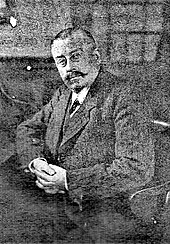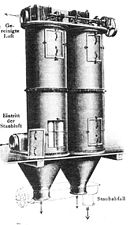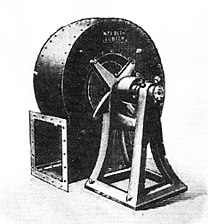Beth (mechanical engineering company)
| Beth Filter GmbH
|
|
|---|---|
| legal form | GmbH |
| founding | 1887 |
| Seat | Lübeck , Germany |
| management | Uwe Stamm, managing director |
| Number of employees | 33 (as of 2008) |
| sales | > € 10 million (as of 2008) |
| Branch | Mechanical and plant engineering , |
| Website | http://www.beth-filter.de/ |
Beth (spelling: BETH ) is a Lübeck mechanical engineering company in the field of environmental technology / dedusting technology based in Lübeck , Schleswig-Holstein . Since January 1, 2016, BETH Filter GmbH has merged with R & R-BETH GmbH. R & R-BETH GmbH was founded in 2006 and is based in Bad Lobenstein .
Foundation and company history
In 1886 the invention of the Beth filter, which later became so important and which could collect harmful dust, was patented . But it was not until December 1887 that the inventor of the filter, the mill construction engineer Wilhelm Beth (Wilhelm Friedrich Ludwig Beth), founded his company, which, as his obituary says, was of international importance. It was called WFL Beth, Mühlenbauanstalt which was later renamed WFL Beth Maschinenfabrik . During his training, the company founder once got to know the unpleasant consequences of the dust.
However, the first few years were difficult due to a lack of financial resources and widespread skepticism about the filter.
The company developed on Waisenallee in the immediate vicinity of the Paul Erasmi canning factory and the Ewers & Co machine factory . In 1910 it comprised an area of 17,000 m², 17 civil servants and 120 workers. In the period from 1900 to 1908, the decisive phase of growth, the production of riveted sheet metal work was increasingly shifted to, but the most important product remained the tubular Beth filter.
The novelty of the invention was the working principle of the Exhaustor in contrast to the conventionally used compressed air. The dust was vacuumed and then blown into a dust chamber or outside. Since there was a problem of a dust explosion , it has been continuously improved. The filters won the highest prizes at domestic and foreign exhibitions.
The main customers for Beth products in the German Empire were industrial mills, fertilizer and cement factories, as well as chemical and coal works. The labor protection legislation opened up a large market for the products, which, however, first had to be tapped.
The company's exports increased as early as 1887. Well-known technical journals became aware of the products. Sales rose accordingly. These were exported to China from 1898 and to the USA in 1900. Branch stores were opened worldwide and Lübeck had gained a new flagship through this company. It generated up to 50% of its sales abroad.
- Beth products
After the First World War , shortly before the company's founder died, the Beth company was converted into a stock corporation.
In the middle of the 20th century the company had a wide range of products. These included dust collection and filter systems and accessories, mobile and stationary vacuum cleaning systems, fans and rotary feeders , screw conveyors and other components for dust handling. From 1956 dry and wet electrostatic precipitators were added.
In 1959 the first edition of the Beth-Handbuch Staubtechnik (self-published by Maschinenfabrik Beth AG) appeared, which was a standard work in the industry for a long time. The second and last edition appeared in 1964. Also in 1959 the company was converted into a GmbH .
Maschinenfabrik Beth GmbH had its own production facilities in Lübeck and a high level of vertical integration until the mid-1990s . They also had their own research laboratories. However, the economic situation deteriorated and in 1997 bankruptcy had to be filed.
Takeover and start-up
It was taken over by the American company AAF International and the re-establishment of Beth Lufttechnik GmbH as a pure engineering company. The location of the new company changed from the old buildings of the machine works Beth in the Waisenallee to the Rabbitborn.
In 2004 there was a second bankruptcy. The business was then taken over by WEIS INDUSTRIES Holding GmbH in July 2004 , and the company, which had shrunk further, moved again.
Until 2012 the company operated as Beth FILTRATION GmbH as an independent GmbH within WEIS INDUSTRIES Holding. Due to the increasing number of employees, another move to a new company building in Lübeck's university district took place at the beginning of 2012 . In 2012 the company celebrated its 125th anniversary. Shortly afterwards, however, the company name BETH disappeared through integration into WEIS Holding.
Almost at the same time, another WEIS Holding company, an automotive supplier, was involved in a corruption affair , which subsequently caused the entire group of companies to get into trouble. The company was renamed ECOPLANT Filtration GmbH again.
After the bankruptcy of WEIS Holding in 2013, BETH is now operating again under the name BETH Filter GmbH. The shareholders are the Riedel brothers (owners of R&R Technik) and Uwe Stamm, who is also the company's managing director.
Current activities
Beth Filter GmbH specializes in the development, construction , sales and commissioning of dust filters for a wide variety of industries. The product range includes bag filters , wet and dry electrostatic precipitators , cyclones and measures for preventive and structural explosion protection .
In addition, the company has gained a foothold with a niche product in the field of renewable energies - a special tar electrostatic precipitator for use in plants for the gasification of biomass .
Fonts
- Beth manual dust technology. Lübeck: machine factory Beth 1959
- 2nd edition, revised by Waldemar Koglin. Lübeck: Machine factory Beth 1964
Web links
Individual evidence
- ↑ a b "For a clean industry", Euromarkt, November 27, 2008
- ↑ patent no. 38396
- ↑ Ed. Wilh. Straus: First and oldest special factory for industry - dedusting, dust collection and ventilation technology. in: Lübeck since the middle of the 18th century. Publisher: Lübeckische Advertisements and Lübecker Zeitung , Lübeck 1926, pp. 340–3463, p. 341 cf. also on the company history Fahl 1935, pp. 116–117; Lübeckische Blätter 1890, p. 404, message 245, Local and mixed notes : WFL Beth was granted a patent no. 53553 of October 20, 1889 for ventilation systems in railroad cars
- ↑ Beth manual dust technology. Lübeck, 1964
- ^ Lübeck advertisements ; Edition of August 29, 1922, article: Wilhelm Beth †.
- ^ The State of Lübeck 1906/1910: Company portrait WFL Beth
- ↑ The State of Lübeck 1906/1910: Description of the Beth filter
- ^ From: Carl Naske: The Portland cement fabrication: A manual for engineers and cement manufacturers. Leipzig: Thomas 1903, p. 184, here for cement production
- ↑ Rüdiger blessing Busch: era - factories in Lübeck ; Lübeck 1993, ISBN 3-7950-0114-5 , chapter: Beth and Dräger - No factory without an idea
- ^ "Skat cards not in demand - strange general meeting at Maschinenfabrik Beth AG in Lübeck", Die Zeit , December 25, 1959
- ↑ Announcement according to §§ 264 Abs. 3, 264b HGB for the business year from October 1st, 2009 to September 30th, 2010 ; Electronic Federal Gazette; https://www.ebundesanzeiger.de/ebanzwww/wexsservlet
- ↑ Beth invests in the Lübeck location, Lübeck Business Information Service, January 30, 2012; under archive link ( Memento of the original from December 13, 2013 in the Internet Archive ) Info: The archive link was automatically inserted and not yet checked. Please check the original and archive link according to the instructions and then remove this notice.
- ↑ Insolvency should bring the salvation , Stuttgarter Zeitung , July 12, 2013
- ^ "Start of the operative business of BETH Filter GmbH in Lübeck", 02elf Düsseldorfer Abendblatt, August 27, 2013








